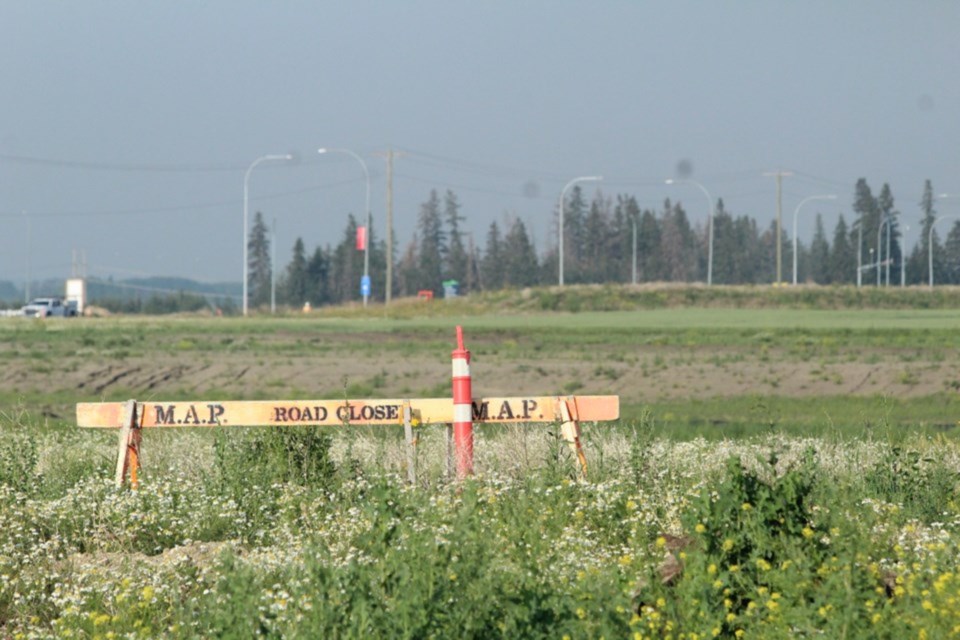City administration is heading into the final phase of a two-year wholesale update and modernization of St. Albert's land-use bylaw and this round of changes are around parking minimums, landscaping and downtown building uses.
The land-use bylaw (LUB) dictates how, and what kind of, development takes place throughout the city. It also regulates development standards, lot sizes, building uses, and much more. A key goals behind the update is to incorporate the policies included in the city's Municipal Development Plan (MDP), called Flourish, which council approved three years ago this month.
The committee of the whole received an update on the project as part of its April 9 meeting, during which the committee heard about a couple of new changes that have been drafted since the committee last received an update in July.
A new report to council written by city planner Barb Dupuis says the new change for parking minimums involves reducing the parking requirements for non-residential buildings from needing to have one parking stall for every 45 square metres of building space to being required to have one parking stall for every 50 square metres of building space. The committee heard, for example, this change would lead to a reduction of three parking stalls for a 1,000 square foot building
For landscaping requirements, Dupuis wrote administration is planning to remove greenfield landscaping requirements in low-density residential areas, which is something that's only applicable to developers. The downtown building uses change is to allow for residential uses on the first floor of downtown buildings, which is currently prohibited.
“The intention is that by allowing more flexibility, there may be more opportunities for redevelopment,” Dupuis wrote.
During the meeting, Coun. Mike Killick said the change to allow residential dwellings on the first floor of downtown buildings “is really troubling.”
“I go back to our strategic planning and and all the work we did around setting priorities and how we would measure and all that really good conversations that we had, and one of the key points was businesses attract businesses,” Killick said. “So,I'm very concerned that ... if we bring [main floor residential] in, it will detract from our key driver of everything we've been talking about over the last couple of years.”
With those concerns in mind, Killick put forward a motion directing administration to remove that change from the draft, but the motion failed with only Killick, Coun. Wes Brodhead, and Mayor Cathy Heron in favour.
Coun. Natalie Joly, speaking against the motion, said she thought the change would increase the diversity of building uses downtown.
“If you go downtown at 5 p.m. on a Tuesday, it is a ghost town, and if people are living downtown, it's just more people who can go to the coffee shop or a restaurant, or whatever they need to do,” Joly said.
Likewise, Coun. Sheena Hughes said she thought removing any restrictions on how buildings can be used downtown will spur development, which is something she and Joly both said was limited to date.
“I also think that just saying that they can't put something in there, it has to be commercial, limits the ability for the developer to actually sell their product," Hughes said. "And as a result, if they don't have the guarantees of what they can actually sell, they don't build,” Hughes said.
“I think the fewer restrictions we have the better, and if ... we become so successful that we cannot possibly manage it, then we'll come back and say, ‘You know what, we're going to have restrictions going forward.’”
As the Gazette reported in November, some of the other changes that administration is proposing to the LUB concern bike parking, electric vehicle charging stations, secondary suites, and new land use districts.
For bike parking, administration is proposing that one bicycle parking spot be required for every seven apartments (and one spot for every three apartments if the new building is located downtown); and six spots will be required for new commercial properties throughout the city regardless of building size.
Currently, the LUB requires bicycle parking to be available for new builds; however, there is no minimum number of spots.
Like bike parking, administration is proposing new shopping centres, hotels, schools, strip malls, and government buildings ensure electric vehicle charging stations represent 1.5 per cent of all parking stalls.
Electric vehicle charging stations will also need to represent at least three per cent of all parking stalls for new apartment buildings, and charging stations will need to represent one per cent of all parking stalls for new townhouse complexes.
When it comes to secondary suites and basement suites, administration's proposed changes aim to encourage homeowners and builders to add or plan for suites to their property.
Currently, single-detached homes in St. Albert are allowed to have one secondary suite on the property, but the draft document proposes to allow two suites per single-detached home, while also allowing duplexes to have secondary suites.
Other proposed secondary suite-specific changes include no longer requiring secondary suites to have parking considerations, and capping the number of bedrooms allowed per suite to three.
The committee heard the next step in the project is a three-week circulation period in which the complete draft bylaw will be distributed to external stakeholders like developers, while at the same time there will be another engagement opportunity for residents online on the city's Cultivate the Conversation platform.
Prior to the circulation period, which is expected to take place next month, city staff will be hosting a public information session on April 25 from 4-7 p.m. in the Arden Theatre lobby.
After the circulation period, city staff will complete a legal review of the draft, and then it will be in front of council for approval in October.




